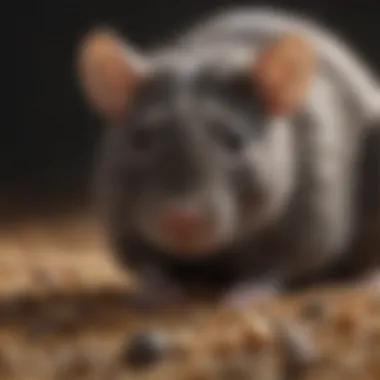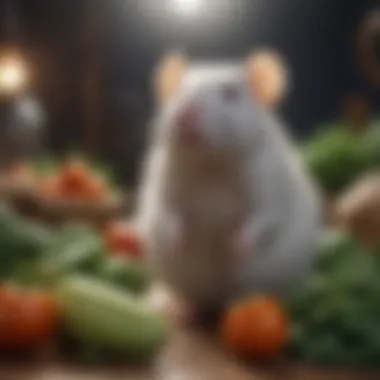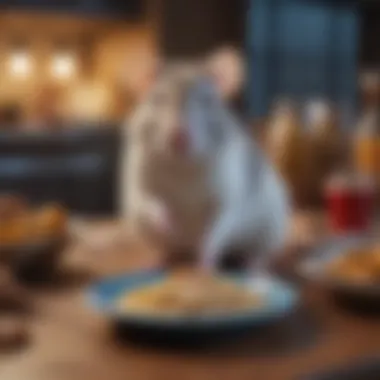Exploring Rats' Dietary Preferences for Optimal Health


Intro
Rats are often misunderstood when it comes to their dietary habits. While many assume that these creatures will eat just about anything, their preferences are more nuanced. Understanding what rats like to eat is essential for anyone involved with them, whether as a pet owner, researcher, or casual enthusiast. This knowledge helps not only in providing optimal diets that promote health but also in preventing common health issues that can arise from inappropriate feeding.
The focus of this article will extend beyond mere preferences, diving into the nutritional needs of rats and the factors shaping their feeding behaviors. Insights drawn from scientific studies and practical experiences will lay a solid foundation for further discussion. Whether you have domestic rats or are interested in their wild counterparts, understanding their diets is a step towards fostering their well-being.
Understanding Your Pet
Pet Behavior Basics
Knowing how rats behave around food is crucial. Unlike many animals, rats are omnivores and enjoy a wide array of foods. They exhibit behaviors such as hoarding and scavenging, which influence their feeding preferences. Observing these behaviors can provide clues about what your pet rat may favor, helping you tailor their diet accordingly.
Common Breed Characteristics
Different rat breeds may exhibit unique eating habits. For instance, dumbo rats may have varying preferences compared to the standard hooded variety. Familiarizing yourself with the specific traits of your rat's breed will assist in identifying what types of food are likely to appeal to them.
Species-Specific Needs
Rats have distinct dietary requirements that differ from other pets. They thrive on a nutritious balance of proteins, carbohydrates, and fats. A mixed diet of grains, vegetables, and proteins can meet these needs. It is essential not only to recognize what rats like but also what is good for them, ensuring their diet is both enjoyable and healthful.
Pet Care and Maintenance
Feeding Guidelines
Feeding rats requires a careful approach. A high-quality commercial rat food provides a solid base for their diet. Supplementing with fresh fruits and vegetables can enhance their meals. Here are some examples that you might consider:
- Leafy greens like spinach or kale
- Fruits like apples, bananas, or berries—but avoid citrus
- Cooked grains like rice or oatmeal
Be cautious with portions, as overfeeding can lead to obesity.
Grooming Essentials
Proper grooming is also key to maintaining a pet rat’s health. While they are relatively low-maintenance, ensuring their fur is clean and free of debris will minimize any potential health issues related to grooming.
Hygiene Practices
A clean habitat is vital for any pet. Make sure their cage is cleaned regularly, removing any leftover food to avoid bacteria buildup. Fresh water should always be available, as hydration plays a significant role in their overall health.
Training and Development
Basic Commands and Skills
Teaching rats basic commands can make handling them easier and more enjoyable. Simple commands can include anything from coming when called to recognizing their names over time.
Behavioral Training Techniques
Positive reinforcement works best for training rats. Offering small treats when they follow commands establishes a connection between the desired behavior and rewards, encouraging them to learn more.
Addressing Common Behavior Issues
Ineffective feeding practices may lead to problems such as aggression or hoarding. Understanding their dietary preferences can alleviate such issues, steered by the principle of satisfaction through proper diet.
Health and Wellness
Routine Vet Check-ups
Regular veterinary visits are essential for monitoring the health of your rat. A vet can provide insights on specific dietary needs based on size, age, and health conditions.
Vaccination Needs
Some vaccinations may be necessary depending on where you live. Consult your vet for guidance to ensure that your rat stays protected.
Recognizing Signs of Illness
Monitoring your rat’s eating habits can reveal underlying health issues. Any sudden changes in appetite can be a red flag and should prompt a visit to the veterinarian.
Enrichment and Activities
Indoor vs. Outdoor Activities


Rats thrive when they are mentally stimulated. Providing toys, mazes, and climbing areas can keep them engaged. Both indoor and outdoor activities have their benefits depending on your space and environment.
Interactive Toys and Games
Interactive feeding toys can provide both enrichment and dietary fulfillment. They can encourage foraging behaviors, allowing rats to use their natural instincts to find food.
Socialization Opportunities
Providing opportunities for social interaction is essential for your pet’s well-being. Rats are social animals who benefit from spending time with both humans and fellow rats.
Prologue to Rat Diet
Another important aspect is the impact of diet on the overall well-being of rats. For pet owners, knowledge of dietary requirements can prevent obesity and other health issues that arise from inadequate diets. Moreover, understanding these preferences can enhance the relationship between humans and their pet rats, as it allows for an enriching feeding experience.
Overview of Rats as Omnivores
Rats possess an interesting classification as omnivores, meaning they consume a wide variety of foods. Their diet typically consists of plants, fruits, seeds, and even insects. This varied diet is a result of their adaptability to different environments. For example, in urban settings, rats may lean towards human food scraps while in the wild, they will forage for grains, fruits, and small creatures.
Being omnivores equips rats with the ability to thrive in many habitats. This flexibility is crucial for their survival and reproduction, allowing them to take advantage of available resources. However, it is still essential to be cautious about what foods are given, especially for pet rats. Some foods that are safe for human consumption can be harmful or toxic to rats.
Importance of Understanding Dietary Habits
Understanding the dietary habits of rats is vital for promoting their health and longevity. Knowledge of what rats naturally prefer can guide pet owners in selecting suitable foods.
There are several reasons why this understanding matters:
- Nutritional Balance: A balanced diet tailored to a rat's needs supports their growth, energy levels, and overall health.
- Preventing Disease: Informed dietary choices can help avert common health problems, such as obesity and dental issues.
- Behavioral Enrichment: Offering a variety of foods can stimulate a rat’s natural foraging instincts, leading to improved mental health and reduced stress.
"A rat's diet greatly affects their behavior, health, and the bonds they form with their owners."
In summary, exploring the dietary preferences of rats is not simply about providing food; it’s about ensuring a quality life for these animals. The insights gathered here will be beneficial for anyone interested in the welfare of rats, whether in a pet or wild context.
Key Nutritional Requirements of Rats
The dietary needs of rats play a crucial role in their overall health and well-being. Understanding what constitutes a balanced diet for rats helps pet owners and enthusiasts alike make informed decisions about feeding. Key nutritional requirements can be broadly categorized into macronutrients, micronutrients, and adequate water supply. Each of these elements contributes to their growth, health, and longevity. When we overlook these aspects, we risk health problems that can arise from nutritional deficiencies or imbalances.
Macronutrients: Carbohydrates, Proteins, and Fats
Macronutrients are the primary building blocks of a rat's diet. They encompass carbohydrates, proteins, and fats.
- Carbohydrates provide energy. These come from grains, fruits, and vegetables. They are essential for day-to-day activities. Without adequate carbs, rats may become lethargic and face challenges in their growth.
- Proteins are critical for development and repair. They support muscle formation and the general health of rats. Proteins can be sourced from legumes, high-quality pellets, and animal products like cooked chicken. Without proteins, rats may suffer growth retardation and weakened immune systems.
- Fats are another vital component. They supply concentrated energy and aid in the absorption of fat-soluble vitamins. Healthy fats can be found in seeds and nuts. A controlled amount is necessary, as excessive fat can lead to obesity and related health problems.
Micronutrients: Vitamins and Minerals
Micronutrients, although needed in smaller quantities, are essential for numerous bodily functions. Vitamins and minerals support metabolic processes and immune function.
- Vitamins such as A, B-complex, C, D, E, and K are all important. For instance, Vitamin C is vital for the health of their skin and prevention of scurvy.
- Minerals include calcium, phosphorus, and magnesium. Calcium is crucial for strong bones and teeth, while phosphorus aids in energy transfers. The right mineral balance is necessary to avoid complications like metabolic bone disease.
Water: An Essential Component
Water is undeniably vital for rats. Like all animals, they need a steady supply of fresh water to maintain hydration levels, support digestion, and regulate body temperature.
- Dehydration can have serious consequences, including kidney damage and decreased appetite. Ensure water containers are cleaned regularly. Replace the water daily to encourage adequate intake.
Healthy hydration habits contribute to a rat's overall health, impacting longevity and energy levels.
In summary, understanding the key nutritional requirements of rats provides a deeper insight into their dietary preferences. Macros and micros together with a good hydration plan can shape a rat's health for the better.
Natural Dietary Preferences
Understanding the natural dietary preferences of rats is crucial for both those who care for them and researchers studying their behavior. Rats thrive in diverse environments, and their diets reflect adaptability to various food sources. By exploring what these animals naturally prefer to consume, we can better cater to the nutritional needs of pet rats and gain insights into the health of wild populations.
What Do Wild Rats Eat?
Wild rats are opportunistic feeders. Their diets include a variety of foods sourced from their environments. Common items in their diets are:
- Fruits and Vegetables: Wild rats often forage for fresh fruits and leafy greens.
- Grains: They eat grains like wheat, corn, and oats, which are plentiful in human habitats.
- Seeds and Nuts: These provide essential fats and proteins.
- Insects: When available, insects become a source of protein that complements their diet.
- Leftovers: Wild rats are known to scavenge discarded food from human activities.


Their flexibility in food choices helps them survive in many habitats, from urban areas to rural fields, where food availability varies.
Influence of Habitat on Food Choices
The habitat where rats reside significantly affects their food preferences. In urban environments, rats have easy access to human food waste. This leads to a diet rich in processed foods, which can affect their health over time. On the other hand, rats in rural settings might have a more natural diet composed mainly of seeds, fruits, and insects.
Factors influencing their eating habits further include:
- Seasonal Changes: Availability of certain foods varies by season. For example, fruits are abundant in the summer.
- Competition for Resources: In areas with limited food, rats may compete with other species, influencing what they will eat.
- Predation: The presence of predators can drive rats to forage in safer areas, affecting their food choices.
"The dietary preferences of rats are not just about survival but reflect a complex relationship with their environment."
Understanding these influences can guide pet owners in creating diets that mimic natural feeding behaviors. By mimicking their habitats and offering a variety of foods, owners promote overall health and well-being for their pet rats. Knowing what wild rats eat teaches us valuable lessons about balance in nutrition.
Common Foods in Rat Diets
Understanding common foods in rat diets is crucial for ensuring their health and well-being. Rats are adaptable creatures, and their diet in the wild greatly influences what they should consume in captivity. This section discusses various food types that should be included in a balanced diet for both wild and pet rats.
Fruits and Vegetables
Fruits and vegetables play a significant role in a rat's diet. These foods are rich in vitamins, minerals, and fiber, which support overall health. Rats can safely consume a variety of fruits, such as apples, bananas, and berries. Vegetables like carrots, broccoli, and peas are also beneficial. However, not all fruits and vegetables are safe. For instance, citrus fruits can cause digestive upset, while onion and garlic are toxic. Always wash produce to remove pesticides before offering them.
Here are some safe options:
- Apples (without seeds)
- Berries (strawberries, blueberries)
- Leafy greens (spinach, kale)
- Carrots
Each type brings essential nutrients that contribute to various bodily functions. Fruits tend to be high in sugar; thus, moderation is essential to prevent obesity or diabetes in pet rats.
Grains and Seeds
Grains and seeds provide essential carbohydrates and are a key energy source for rats. Whole grains like brown rice, oats, and barley should be included in their diet. These grains are high in fiber, supporting digestive health. Seeds such as sunflower seeds and pumpkin seeds are high in healthy fats and proteins. However, it is important to offer these in moderation to avoid obesity.
A balanced mix of grains and seeds offers:
- Energy from carbohydrates
- Fiber for digestive support
- Healthy fats for overall health
Organic options are preferred as they are free from harmful additives. When providing grains, ensure they are not moldy, as this can be harmful.
Protein Sources
Protein is vital for rats as it helps build and repair tissues. High-quality sources include cooked eggs, lean meats, and certain dairy products like plain yogurt. Additionally, fish can be a good occasional treat. Protein-rich foods help maintain muscle mass and overall health. However, avoid processed meats, as these often contain preservatives and additives that can be harmful.
Ensure that:
- Protein sources are fresh and cooked
- Treats are given in moderation
Commercial Rat Food: What to Look For
Choosing the right commercial rat food is essential for providing balanced nutrition. Look for products that list whole grains as the first ingredient, along with a mix of proteins, vitamins, and minerals.
Consider these factors when selecting commercial food:
- High-quality ingredients
- No artificial colors or preservatives
- Balanced ratios of protein, fat, and fiber
Many brands offer fortified pellets that are nutritionally complete and designed specifically for rats.
"A well-chosen commercial diet can reduce the need for additional supplements while ensuring your pet rat gets the necessary nutrients."
In summary, a rat's diet can consist of various foods, including fruits, vegetables, grains, seeds, and proteins. Each food group provides essential nutrients that contribute to health and well-being, whether for domestic pets or their wild counterparts.
Factors Influencing Food Preferences
Understanding the factors influencing the food preferences of rats is crucial for both pet owners and researchers. These factors shed light on why certain foods are favored over others and how dietary habits can be optimized for health and well-being. This section breaks down the main elements that impact what rats choose to eat, emphasizing genetics, environment, and social behaviors.
Genetic Factors and Taste
Genetic predispositions play a significant role in determining the taste preferences of rats. Each rat has a varied genetic makeup that affects its sensitivity to different flavors. Some may prefer sweet tastes while others lean towards savory or bitter. Studies have shown that these taste preferences can influence food selection, thus impacting overall nutrition.


Rats have specific receptors that respond to various compounds found in food. For example, sweet-tasting chemicals are often more appealing, encouraging these animals to consume higher amounts of sugars in their diet. This preference for sweetness could have evolved as an adaptive mechanism to seek out ripe fruits, which are often high in sugars and energy. Understanding these genetic components can help owners tailor diets that match the natural inclinations of their pets.
Environmental Impact on Eating Habits
The environment where rats reside greatly impacts their eating habits. Wild rats often face different challenges than pet rats, leading to diverse diets based on availability. For instance, a rat living in a forest may have easier access to fruits and plants, while one living in urban areas may focus more on human food waste, including grains and leftover scraps.
Furthermore, environmental conditions such as seasonality can influence food choice. During warmer months, certain foods such as fruits are more abundant, while colder months may restrict options, shifting preferences towards nuts and seeds. This adaptability in food choice highlights rats' remarkable ability to utilize their surroundings for survival. It also stresses the need for pet owners to mimic a varied diet, providing opportunities for exploration and choice that reflect these natural tendencies.
Social Behavior and Food Sharing
Social behavior greatly affects how rats approach food and their nutritional intake. Rats are known to be social creatures; they often eat in groups. This behavior can lead to the sharing of food, which might affect individual dietary choices. When one rat discovers a new food source, it can influence the others to try it. This communal aspect can sometimes prompt more exploratory eating behaviors.
Rats may also learn from each other about what is safe to eat or what might be avoided. Observational learning in these social interactions can expand their diet and help them avoid foods that could be harmful.
"A rat's diet is more than just an assortment of foods; it is a reflection of its genetics, surroundings, and social interactions."
By recognizing these factors, we can better support the health and longevity of these intelligent animals.
Feeding Pet Rats: Best Practices
Feeding pet rats is a crucial aspect of ensuring their overall health and happiness. Proper nutrition provides the essential nutrients they need to thrive and supports their unique biological needs. Understanding how to cater to their dietary preferences helps pet owners create an environment that fosters well-being. It also contributes to longevity, reducing the risk of various diseases associated with improper diet.
Creating a Balanced Diet for Pet Rats
A balanced diet for pet rats includes a mixture of various food types to fulfill their nutritional requirements. Focus on providing a combination of commercial rat food and fresh foods. Here are the key components to include:
- High-Quality Pellets: Look for rat pellets that are made specifically for their needs. They should contain a good balance of protein, fat, and fiber. Avoid seed-based diets as they can lead to selective eating, which is not healthy.
- Fresh Fruits and Vegetables: Incorporate safe fruits like apples, bananas, and berries, as well as vegetables such as broccoli and carrots. These add variety, vitamins, and moisture to their diet. It's vital to wash these foods and chop them into manageable pieces.
- Protein Sources: Rats require protein for growth and repair. Good sources include cooked chicken, hard-boiled eggs, or commercial insect-based treats. Consider varying these sources to prevent dietary boredom.
- Occasional Treats: Offer small amounts of nuts and grains as occasional treats. Be sure to monitor portion sizes to avoid excessive calorie intake.
This balanced diet will support their energy levels and promote a healthier lifestyle. Remember, fresh water should always be available, as hydration is essential for their health.
Common Mistakes in Rat Nutrition
Many pet owners make certain mistakes when it comes to rat nutrition. By identifying these common pitfalls, owners can better cater to their pets' dietary needs.
- Relying Solely on Seed Mixes: Seed mixes can seem appealing; however, they often lack the balanced nutrition rats require. As mentioned before, these mixes can lead to selective feeding. This results in nutritional deficiencies over time.
- Ignoring Fresh Produce: Some owners may overlook the importance of fresh fruits and vegetables. These foods provide vital nutrients and should make up a regular part of their diet. Avoid using only processed foods, as they lack essential vitamins.
- Feeding Harmful Foods: Certain human foods can be toxic to rats. Foods like chocolate, caffeine, and citrus fruits should be strictly avoided. Always research or consult a veterinarian about safe foods.
- Overfeeding: Providing excessive amounts of food can lead to obesity. It's important to control portion sizes and ensure that treats are given in moderation.
Understanding these common mistakes is vital. With proper awareness, pet owners can help their rats lead healthier, happier lives.
Health Considerations
Understanding health considerations is fundamental in ensuring the well-being of pet rats. These creatures may appear robust, yet they are vulnerable to various dietary-related issues. A careful assessment of their diet can prevent severe health problems. Proper nutrition supports their overall health, longevity, and happiness.
Obesity in Pet Rats: Causes and Prevention
Obesity in pet rats is an emerging concern that requires attention. It is often caused by overfeeding, lack of exercise, and the provision of high-calorie snacks. These factors can lead to excessive weight gain, which poses health risks such as diabetes, heart disease, and joint discomfort.
To prevent obesity, pet owners should provide a balanced diet. Portion control is another crucial factor. Rats are small animals, and their daily food intake should be carefully measured. Exercise is vital; ensuring a stimulating environment fosters activity. Simple toys can engage them and promote movement. Consider replacing unhealthy treats with healthier options such as small pieces of fruit or vegetables. Monitoring your rat's weight regularly is also necessary.
"A balanced diet and an active lifestyle can significantly enhance the health and quality of life for pet rats."
Signs of Nutritional Deficiencies
Nutritional deficiencies in rats can manifest through various signs. Recognizing these early can help pet owners take action promptly. Common indicators include fur loss, lethargy, and unusual weight changes. Each characteristic points to a potential deficiency in essential nutrients.
For instance, Vitamin C deficiency can lead to scurvy, resulting in poor coat and dental problems. Lack of calcium may cause weak bones, manifesting as difficulty in movement. Keeping track of your rat's behavior and health through regular check-ups can help identify issues early.
In summary, understanding health considerations related to dietary habits is not just beneficial, but essential. By being aware of obesity and nutritional deficiencies, pet owners can actively contribute to their rats' health and well-being.
The End
Summary of Key Insights
This article has discussed several important aspects concerning rat diet. Key insights include:
- Omnivorous Nature: Rats consume a diverse range of food, which includes fruits, vegetables, grains, and proteins.
- Nutritional Requirements: A balanced diet should include necessary macronutrients and micronutrients to support their health and well-being.
- Habitat Influences: The natural environment plays a significant role in shaping their dietary choices. Wild rats adapt their food preferences based on what is available in their surroundings.
- Food Preferences: Factors such as genetics and social interactions can influence what rats choose to eat. This helps pet owners understand how social environments can impact feeding habits.
Implications for Rat Care and Management
For pet owners, the insights from this article highlight the importance of a well-rounded diet in promoting the health of their rats. Here are some implications:
- Balanced Diet Creation: Owners should aim to provide a variety of foods, ensuring all nutrient requirements are met.
- Monitoring Health: Keeping track of a pet rat’s weight and eating habits is vital. Any significant changes may be a sign of health issues that need to be addressed.
- Education on Foods: Understanding what foods are suitable and what should be avoided is essential to prevent health problems.
In summary, by grasping the factors that govern dietary preferences in rats, owners can effectively support their pet's well-being while also enhancing the quality of their lives.







